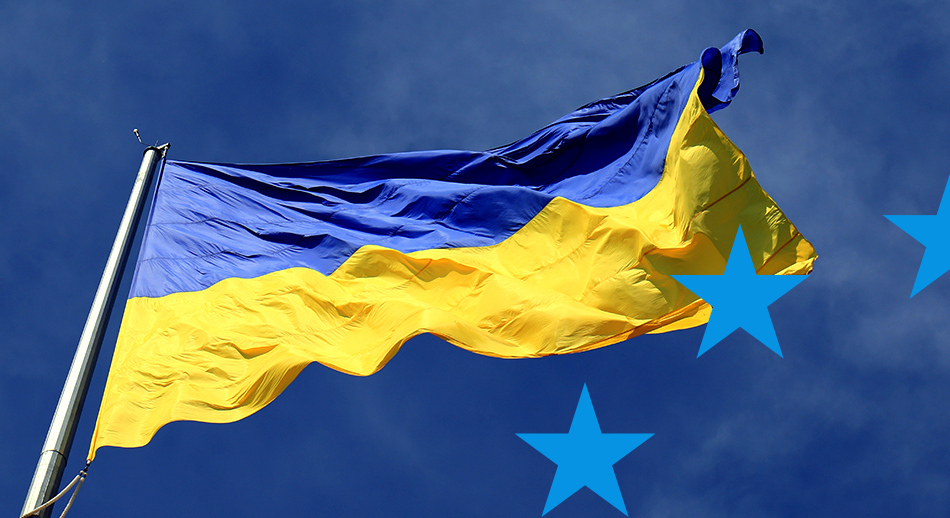Ukraine’s aggression, war and humanitarian crisis have shaken consciences in Europe and around the world. The EU is moving, in all respects.
A unanimous position and concrete support
“The EU and its international partners are united in condemning Putin’s aggression against Ukraine. We will offer support to those seeking refuge and help those seeking a safe way home. The EU will continue to offer substantial political, financial and humanitarian support to Ukraine and to impose tough sanctions against Russia and those complicit in the war.”
This incipit effectively sums up the position of the European Union and its solidarity with the Ukrainian people. It expresses a feeling of horror at the human tragedy, condemnation of the attack and full sympathy for the affected populations-a feeling that the Europlanning Guide, in its own small way, also wants to help confirm and spread.
Dealing in depth with major international political issues or the evolution of the military and humanitarian emergency is beyond the scope of this Guide. However, we intend to show our closeness and commitment to this cause by disseminating some practical information and some interesting analyses in line with our scope of work.
In fact, Europlanning is not “an island,” but acts in an ever-changing world-with the intention of improving it.
In this first post devoted to this topic, we will analyze the position and actions of the main EU institutions, each carrying a different point of view on the Ukrainian crisis. As we shall see, even very large events such as this one have an important link to the world of europlanning.
The European Commission: the practical aspects
The European Commission has opened a page dedicated to supporting the Ukrainian crisis , from which we took the incipit of this article. A calendar and a space dedicated to the latest news make it possible to follow the European Commission’s action in the context of the crisis, which is often unclear to a public exposed to an increasing amount of shocking news and dramatic stories.
The European Commission is the “operational arm” of the European Union. Its action is thus, by extension, the action of the European Union, and covers many complementary areas of action:
- The fight against disinformation (an aspect always been fundamental , even more so in these times);
- The sanctions (to weaken the economic base of the war and increase its cost to the political elite);
- Various actions and mechanisms of assistance and aid humanitarian and civil protection (through the appropriate instruments 1 | 2 – equipped with additional emergency packages of 500 and 100 million euros, respectively);
- L’ activation of an appropriate Temporary Protection Directive in the event of a mass influx of displaced persons to and between member states (to facilitate transit, support and assistance), supplemented by appropriate operational guidelines for member states;
- The activation of a page dedicated to practical directions for support to populations fleeing Ukraine: national authorities in charge, testimonies and who to contact (country by country) to lend a hand ;
- The activation of a page dedicated to practical guidance for fleeing populations : what it takes to obtain refuge in the EU (very little if anything in the emergency situation), the rights in terms of temporary protection, asylum, assistance in repatriation and in the mobility in Europe to the country of destination.
All of these pages are accessible in Ukrainian and Russian and show, in the most practical and concrete terms, what the European Union is doing to support the Ukrainian people and cope with the crisis.
EU foreign policy: the strategic and military aspects
However, the Ukrainian crisis is not only a human tragedy but also an international political, diplomatic and military crisis, which falls within the remit of the European External Action Service (EEAS) and the High Representative EU.
The EEAS website presents a constantly updated collection of news, articles, videos and stories regarding the Ukrainian crisis. In particular, for better insight, we recommend reading the content articles in the EU High Representative’s blog ( Josep Borrell ), responsible for the European Union’s foreign policy. The blog is regularly updated and currently contains very timely and detailed posts on the following topics:
- What is it and how to implement the “Strategic Compass” (see below);
- The integration of Balkan countries into the EU in light of the current crisis. ;
- The implications of the war in Ukraine for the European Union. ;
- The future of Europe in light of the implications of the war in Ukraine. ;
- The importance of defending and supporting Ukraine and to resist attempts to rewrite the “rules of the game” by authoritarian countries.
The blog also collects other speeches, videos and interviews from the EU High Representative.
The Strategic Compass, the plan to strengthen the European Union’s security and defense policy, is one of the most important and recent innovations for the European Union. Approved by the Council on March 21, the Strategic Compass is a response triggered by the European Union’s foreign, security and defense policy challenges and weaknesses – highlighted most clearly by the Ukraine crisis, but already evident and under discussion long time.
The Strategic Compass is presented in this video and in this document and summarized in various fact sheets: Strategic Compass , rapid intervention capability , Peace Facility , structured and permanent cooperation , military mobility , security and defense policy , partnership with the UN , partnership with NATO , marine security , cybersecurity ). All these aspects are further summarized in the four basic pillars of the Strategic Compass:
- “Act” (rapid intervention capability for military and peacebuilding missions);
- “Secure” (ability to act on strategic security aspects, such as intelligence, cybersecurity, hybrid threats, manipulation attempts, space technologies, and seas);
- “Invest” (increased spending and technological capabilities in defense);
- “Partners” (greater understanding and collaboration with NATO, regional and global partners, and specific countries).
Of course, the Strategic Compass will also be called upon to address one of the great challenges of European defense, which is also one of the main priorities of the European Defense Fund : to increase the effectiveness, coordination and coherence (including in technical and technological terms) of the military forces of individual European countries, which are far larger than the common European forces. Here a series of questions and answers regarding this new tool.
The European Parliament: the political aspects
The European Parliament has also opened a page dedicated to supporting the Ukrainian crisis . Ukraine has been a priority partner of the European Union for years and benefits from various forms of support, including a Association Agreement which establishes, among other things, a broad and generalized free area, various forms of political and financial support, increasing political dialogue, and gradual convergence toward European standards and policies in various areas (including security and defense).
This Association Agreement was a key turning point in Ukraine’s rapprochement with the European Union and in the history of the current crisis: it was the failure of then-President Janukovyč to sign the agreement at the turn of 2013-2014 that triggered the events known as “Euromaidan” and the subsequent Ukrainian Revolution of 2014. The Russian reaction to this “axis shift” toward the EU, which has been particularly evident and violent since 2022, actually lasts since 2014 with the Russian annexation of Crimea and the armed clashes in the Donbass area. .
The dedicated page of the European Parliament offers many particularly interesting insights, especially in understanding the political roots of the current crisis and the ensuing political debate:
- A news section , which makes it possible to follow the debate on various aspects related to the Ukrainian crisis, in a concise and timely manner;
- A series of briefing papers on various issues that are concise and interesting. We report for example: a’analysis and a collection of articles of December 2021; analysis on aspects military, international, food, energetic, of budget and of assistance; etc.;
- A section dedicated to multimedia content , including in particular podcasts (on the reasons for the difficult EU-Russia relations and on the EU support for Ukraine ) and videos with testimonies, statements by members of the European Parliament on the issue and the appeal of the Ukrainian President Zelensky to the European Parliament.
The European Council: an overview
The European Council pages carry information organized even more concisely, following stages consistent with the moments of discussion among EU leaders and useful for an overview of the topic.
Milestones in the response to the crisis by the Council have been to date:
- La special meeting of the European Council on the Ukrainian crisis on February 24, 2022 (on the day of the invasion) and the related joint statement, from which a firm condemnation emerges; followed by the informal meeting of heads of state or government on March 10 and 11, 2022, showing commitment to support Ukraine in the crisis and its European path, confirming condemnation and further sanctions against those responsible; and from the recent European Council of March 24 and 25, 2022, which was also attended by the Ukrainian (Zelenzky) and U.S. (Biden) presidents and in which the commitment to the reconstruction of a democratic Ukraine, support for civilians and refugees, and the implementation of additional sanctions was confirmed.
The recent decision to establish a Solidarity Trust Fund for Ukraine by the EU and with international participation, to address the crisis and future reconstruction, is certainly an important new step in EU support;
- The adoption of sanctions, carried out at successive times: the February 23, the February 25, on February 28 (1 | 2), March 2 (1 | 2 | 3), the March 9 and March 15 (1 | 2);
- The adoption of measures of commitment and solidarity, which retrace what the European Commission explained in more detail: the activation of a mechanism of temporary protection of refugees (compatible, if necessary, with more durable forms of asylum), activation of a solidarity platform between the EU and member states, humanitarian and civil protection aid, support technician and financial (1 | 2 | 3) to member states to deal with the crisis and take in refugees, assistance to Ukraine through financial loans (6.2 billion in total) and military supplies (1 billion, 1 | 2).
All these stages are retraced and constantly updated in a page devoted to a detailed chronology of EU action toward the Ukrainian crisis . This overview is supported by many interesting infographics:
- On “Strategic Compass” ;
- On Temporary refugee protection mechanism ;
- On the energy price trends ;
- On the EU sanctions against Russia (here an first version );
- On Eastern Partnership and on related support measures (pre-crisis).
The role of philanthropy
Philanthropic institutions have also expressed their solidarity and commitment to this cause. In recent weeks, funds have been created, appeals for donations have been launched, and statements have been issued in support of those affected by war and those who advocate for full compliance with international humanitarian law and the protection of civilians and civil society, in Ukraine, Russia, Belarus, and around the world.
The leading network of European institutional philanthropy, Philea – Philanthropy Europe Association , has championed a more coordinated approach and launched two portals that bring together efforts and initiatives developed by philanthropic institutions and other organizations: PhilanthropyForUkraine.eu e NGOforUkraine.eu . Initiatives in favor from Ukraine can be posted on the two portals and consulted to foster full visibility and coordination among the different appeals and types of action.
The world of Italian foundations of banking origin, with the coordination of ACRI , has developed a system-wide intervention that includes the allocation of 2 million euros to support the work of some NGOs mobilized in assisting Ukrainian refugees. In addition to joining this fund, many bank foundations have in parallel launched other initiatives in support of Ukraine that address multiple issues, from supporting transparent information, to helping artists, to supporting children, to providing shelter space for refugees.
Concluding reflections
It is clear that the current crisis has and will have strong immediate, medium and long-term repercussions; dramatic, on the lives of the people involved in the conflict, but also on the lives, economy and security for the citizens of all countries of the world. At the conclusion of this first in-depth look at the topic, we attempt to identify some of the ways in which the current crisis may affect the world of europlanning and European projects, which are our area of analysis.
First, the current conflict shifts and will shift thestrategic axis of European policies toward an external and geopolitical dimension. The establishment of a Strategic Compass and the direction taken in terms of greater engagement and integration in the defense sector are certainly a response to a strategic and long-term priority of the European Union, but they are clearly being accelerated and intensified by the ongoing crisis.
As a result, we are witnessing theextension of the use of existing funds and the activation of new types of funds to the emergency, and the reconstruction (material and strategic) that will accompany the end of the emergency. Some examples:
- The future Solidarity Trust Fund for Ukraine. ;
- The adaptation of the regulation of the Structural Funds and the FAMI Fund (Asylum, Migration and Integration) to cope with the emergency and advance of the REACT-EU funds ;
- The activation of funds and measures for the humanitarian emergency , of the Civil Protection Mechanism EU and RescEU medical supplies.
In addition to measures for shelter, humanitarian aid, and civil protection, similar dynamics may apply to funds and strategic efforts earmarked for defense and security (already outlined in our Guide ).
These transformations may change some of the community budget balances (painstakingly achieved just over a year ago ) and their respective allocations for funds and programs. There has already been talk (among other things, and in still very possibilistic terms) about the “replication” of the mechanism already adopted for the Recovery and Resilience Facility to deal with a new emergency: no longer a health emergency, but a humanitarian, international and reconstruction emergency.
The impact of the ongoing crisis has also been directly felt in the daily life of some European projects: for example, the Commission will not conclude new contracts or agreements with Russian organizations under the Horizon Europe program and has suspended payments to Russian entities under existing contracts.
The new international situation has, on the one hand, shown the differences between member countries, for example in terms of the weight and impact of Russian-sourced energy supplies, but it has, above all, highlighted their willingness to move forward more united and more compactly in addressing major international challenges.
This could revive, as has happened at other times in history, a process of European integration more decisive and more aimed at overcoming internal contrasts, in the common interest. The European Union has ensured the longest period of peace in Europe and the largest union of peoples ever achieved in history, based on the principles of the rule of law, democracy, freedom and equality. The new threat leads EU countries and citizens to rediscover this perspective, intrinsic to the very existence of the European Union.
The world changes, and eurprojecting changes with it. We will explore some of these aspects in more detail in our upcoming updates-continue to follow us.




